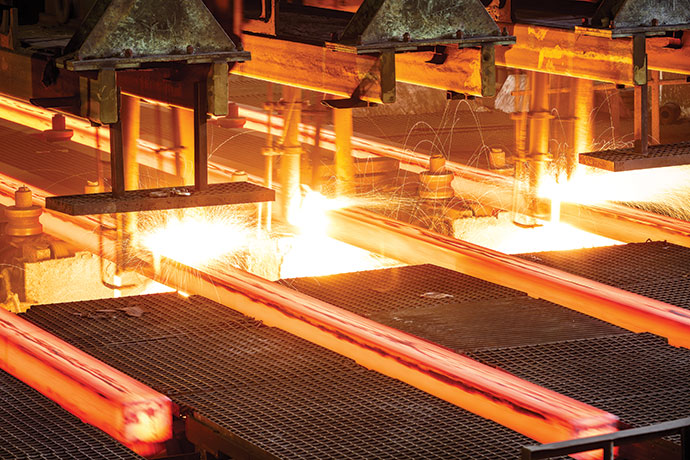Since assuming office on Dec. 8, 2015, Kentucky Gov. Matt Bevin has pursued two goals with a single-minded purpose: overhauling the state’s business climate and turning Kentucky into an engineering and manufacturing hub of excellence.
On March 27 of this year, he secured a win that confirmed progress on both fronts. Nucor Corp., the largest steel producer in America, announced that it would invest $1.35 billion to construct a new steel mill in Brandenburg in Meade County and create 400 jobs over 15 years.
The 1.5-million-sq.-ft. plant will be built along the Ohio River southwest of Louisville on land that currently hosts a grain shipping port. The average annual wage at the new plant will be $72,000.
“Nucor is a proven, longtime corporate citizen in Kentucky and a key partner in our world-class primary metals industry,” Bevin said. “This massive project will transform the region’s economy and provide high-quality jobs to Kentuckians for generations to come. Thanks to Nucor’s strong commitment to the commonwealth, we are taking another momentous step toward solidifying our reputation as America’s engineering and manufacturing center of excellence.”
The announcement came just six months after Nucor announced a $650 million, 70-job expansion at Nucor Steel Gallatin, a mill producing flat-rolled coils in Ghent. That project promises to nearly double the mill’s annual capacity to about 3 million tons. An earlier expansion project, announced in May 2017, involves $176 million in capital investment and creates another 75 full-time jobs.
Nucor executives said on March 27 that construction on the new mill in Brandenburg should begin by year-end with the facility opening by 2022. The project could create as many as 2,000 construction jobs.
“The new plate mill will grow our company’s already significant presence in Kentucky,” said John Ferriola, chairman, CEO and president of Charlotte-based Nucor. “Nucor is currently investing more than $2 billion in our Kentucky operations.”
State Chips In $40 Million
The Kentucky Economic Development Finance Authority approved the company for tax incentives up to $30 million through the Kentucky Business Investment program. The incentive allows Nucor to keep a portion of the new tax revenue it generates through corporate income tax credits and wage assessments by meeting job and investment targets. KEDFA also approved up to $10 million in tax incentives through the Kentucky Enterprise Initiative Act, which allows firms to recoup Kentucky sales and use tax on construction costs, building fixtures, and equipment used in R&D and electronic processing.
Terry Gill, secretary of the Kentucky Cabinet for Economic Development until his April resignation, called the Nucor announcement “a huge win for the state and a transformative opportunity for Meade County and Brandenburg. So much of our work revolves around existing relationships with established businesses, and this deal confirms that.”
“Nucor is currently investing more than $2 billion in our Kentucky operations.”
In an interview prior to his resignation, he added that “the Nucor CEO said the decision to build a greenfield mini-mill was based on many of the same reasons that led Braidy Industries two years ago to invest in a large aluminum plant in Eastern Kentucky. They can take the cost advantages of locating here and build them into their pricing for their customers.”
Gill says the momentum of a record-breaking three-year run for Kentucky shows no signs of abating. “If you look at our momentum in 2019, there is a certain energy level, a buzz, around doing business in Kentucky,” he says. “We are closing in on almost $19 billion in new capital coming into the state during this administration. We are becoming top of mind. Amazon, Toyota, Braidy, Nucor, etc. — they’re all significant, transformative and disruptive deals. Businesses are now looking at Kentucky, and we are making the short list.”
From Russia With Cash
That is especially true in the primary metals sector. On April 15, Russian company Rusal announced its intent to invest $200 million into the Braidy Industries aluminum rolling mill near Ashland. Braidy is still working to fully finance the $1.7 billion project, and received further reassurance when BMW later signed on to buy aluminum sheet from the mill.
Rusal, the world’s largest producer of aluminum outside of China, has historically been the No. 2 non-domestic supplier of prime aluminum to the U.S. The partnership aims to create the first low-carbon-impact industrial aluminum rolling mill operation in the world. The U.S. had previously placed sanctions on Rusal, but the U.S. Treasury Department lifted those sanctions in January.
The Braidy Atlas plant project will create 1,500 construction jobs, 650 permanent manufacturing jobs, and about 3,600 additional jobs. Jack Mazurak, communications director for the Kentucky Cabinet for Economic Development, says, “Plants like this are choosing to locate here because Kentucky offers the lowest industrial power rates east of the Mississippi. Plus, Kentucky is located on both the Ohio River and the Mississippi River. You can barge in the raw materials and either use the highway system or barge to ship out your end product.”
The Aluminum Association says 2018 data show more than 9,760 direct jobs in Kentucky’s aluminum sector — part of an overall supplier and induced economic impact accounting for more than 18,500 jobs, $2.6 billion in wages and $12.2 billion in output.
Proximity to the automotive manufacturing plants in the Mid-South and Midwest creates demand for steel and aluminum, says Mazurak.
“As automotive manufacturers lightweight their vehicles by moving to aluminum and lighter steel, we will see more need for these types of primary-metal production facilities. The Nucor steel plant in Brandenburg, for example, will supply a general manufacturing base in Kentucky and the South.”

